The post Why Does China Never Want to Ally with Russia? first appeared on China Academy.
]]>Historical Analysis
Many people lack understanding about China’s founding leaders. It is no exaggeration to say that the first-generation leadership of the People’s Republic of China ranks among the very best in the entirety of Chinese history. Their strategic vision and intellectual depth were so extraordinary that they far surpassed the comprehension of the average person.
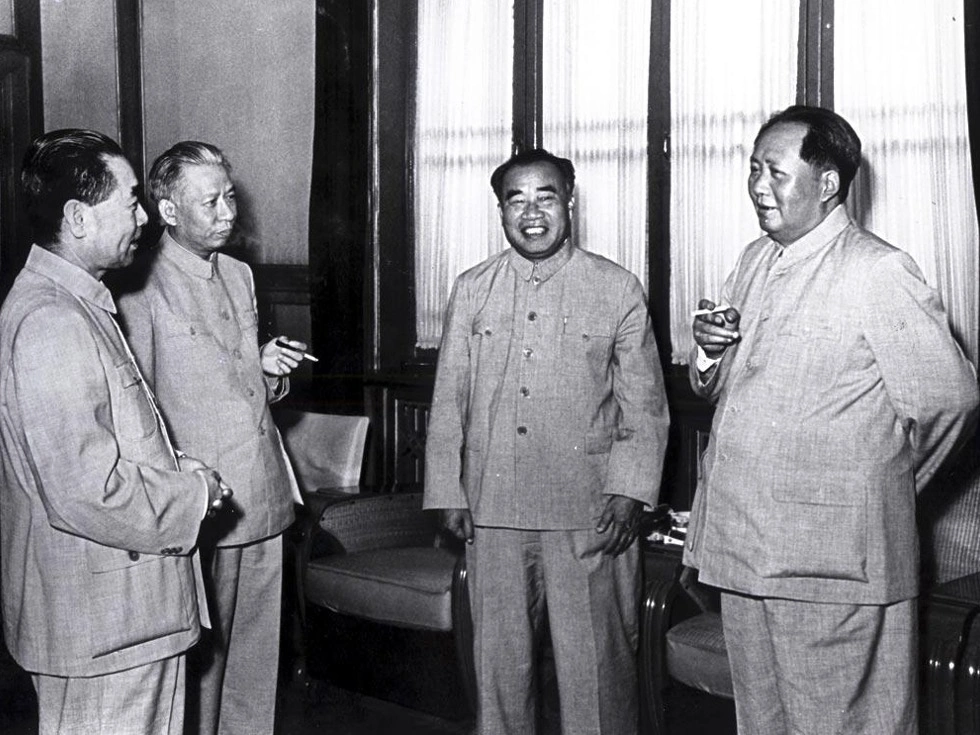 Zhou Enlai, Former Chinese Premier (Left 1); Liu Shaoqi, Former Chinese President (Left 2); Zhu De, Former Commander-in-Chief of the PLA (Left 3); Mao Zedong, Former Chinese President (Left 4)
Zhou Enlai, Former Chinese Premier (Left 1); Liu Shaoqi, Former Chinese President (Left 2); Zhu De, Former Commander-in-Chief of the PLA (Left 3); Mao Zedong, Former Chinese President (Left 4)
First, China’s founding leaders were individuals of great integrity and confidence. They firmly believed in China’s potential and were convinced that the country’s decline in the 1900s was only temporary. They were confident that, given time, China would rise again to become one of the world’s most powerful nations.
What was China’s situation in 1949? The country had endured a series of devastating wars, including the Opium Wars, the Jiawu War, the invasion by the Eight-Nation Alliance, and the Japanese invasion during World War II. These experiences left the Chinese people deeply unwilling to align themselves with Western powers, whom they saw as aggressors responsible for some of the greatest suffering in modern Chinese history.
Second, the founders of China had ideals. There are still two lines of characters hanging on Tiananmen Square in Beijing: Long live the People’s Republic of China! Long live the great unity of the people of the world! Many people in that era really wanted to liberate all mankind and regard the lower classes of the world as a community of interests. This kind of pure people disdain to engage in bloc confrontations, especially for some actions of the Soviet Union in the late 20th century, which they despised from the bottom of their hearts because it violated their ideals.
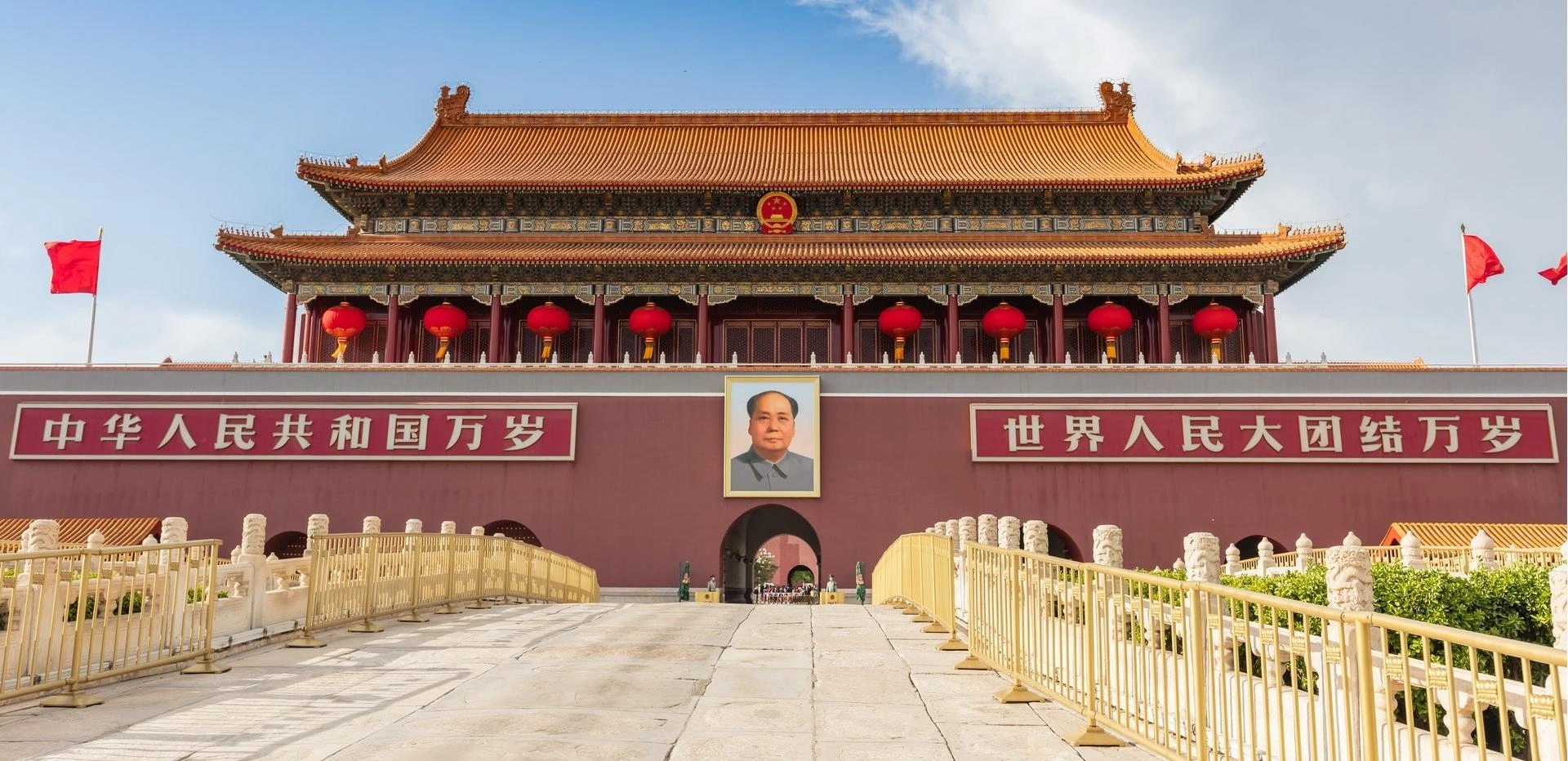
Therefore, in 1953, Premier Zhou Enlai explicitly articulated China’s foreign policy principles—the Five Principles of Peaceful Coexistence. This was a clear message to the world: China treats all nations as equals. China does not seek hegemony, nor does it engage in bloc confrontations. As long as you respect us and are willing to cooperate, our doors will always remain open to you.
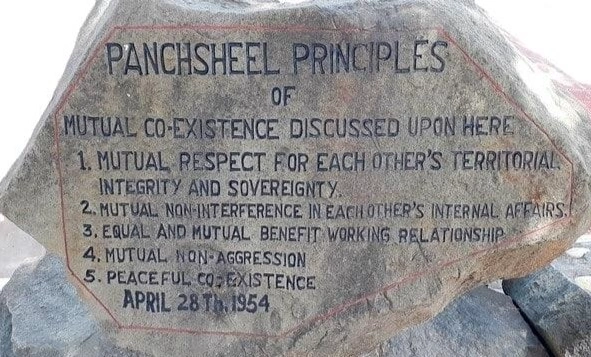
This marked the beginning of China’s non-alignment policy, a stance that was firmly established from the outset. Subsequent events further solidified China’s resolve to avoid alliances. One pivotal moment was the fallout with the Soviet Union. After Nikita Khrushchev came to power, he demanded the establishment of a long-wave radio station and a joint fleet in China. This was, in essence, an attempt to control China’s sovereignty through a military alliance, effectively reducing China to a subordinate state.
This incident deeply impressed upon the Chinese people the risks associated with alliances—specifically, the potential compromise of sovereignty, which was fundamentally at odds with China’s core principles. After the Sino-Soviet split, China lost all interest in forming alliances, as the experience had starkly highlighted the dangers of ceding control over its own affairs.
Moreover, there were other bizarre incidents that further reinforced China’s stance.
For instance, China’s aid to Albania between 1954 and 1978 amounted to a staggering $10 billion, encompassing industrial equipment, food, military supplies, and more. Yet, what was the outcome? Albania’s leader, Enver Hoxha, repeatedly criticized China in public forums. Then, in 1978, when China had to halt its aid due to its own economic difficulties, Albania immediately turned its back on China, severing ties without hesitation.
Then there were the incidents involving Vietnam and Indonesia.
China had provided Indonesia with aid on multiple occasions, only to be met with dozens of anti-dumping investigations launched by Indonesia against China. Moreover, at the end of the 20th century, Indonesia was the site of the notorious “Black May” riots, during which the country’s Chinese community was targeted in violent attacks, resulting in significant casualties.
As for Vietnam, the situation was even more egregious. China had supplied Vietnam with weapons and food, aiding them in their fight against American forces. However, Vietnam later turned around and used the very resources provided by China to launch an invasion against China. This betrayal ultimately led to the Sino-Vietnamese War, a conflict China was forced into in self-defense.
The Chinese people witnessed all these events unfold, and they learned a profound lesson: when you are weak, having numerous allies is meaningless. Others can betray you at any moment for their own interests. Moreover, the enormous costs of maintaining these so-called friendly relationships can severely burden the domestic economy.
Realistic Analysis
Why is China reluctant to form alliance treaties with other countries? Take Sino-Russian relations as an example. If China and Russia were military allies, the moment the Russia-Ukraine conflict broke out, China would be obligated to send troops to Ukraine. What kind of chain reaction would this trigger?
First, China’s military spending would skyrocket, with hundreds of billions of dollars annually diverted to supporting military operations abroad rather than being invested in domestic industrial upgrades and scientific research.
Second, once China intervened in the Russia-Ukraine conflict, there would be no room for reconciliation with the European Union (EU). Recent tensions between the EU and the United States have shown that the EU is a potential partner China can engage with. The China-Europe Railway, for instance, generates significant profits and orders for China every year. Would it be worth completely alienating the EU for the sake of Russia?
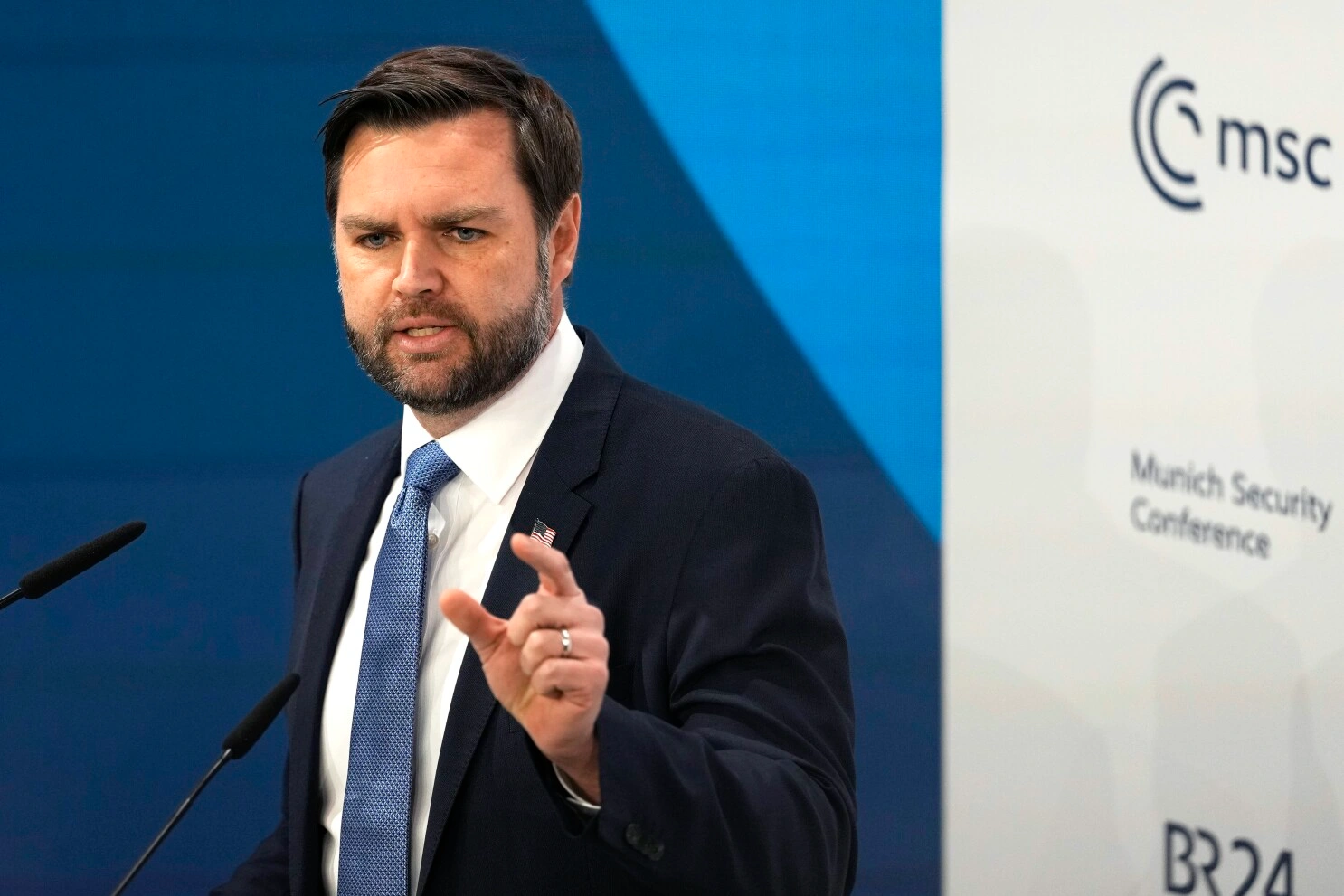 During U.S. Vice President J.D. Vance’s speech at the Munich Security Conference, he stunned the world with sharp criticism of European countries on issues of free speech and immigration policies.
During U.S. Vice President J.D. Vance’s speech at the Munich Security Conference, he stunned the world with sharp criticism of European countries on issues of free speech and immigration policies.
Third, alliance commitments could drag China into military conflicts against its will, disrupting its domestic industrial upgrading and strategic planning. Additionally, when the Russia-Ukraine conflict first erupted in 2022, global public opinion largely labeled Russia as the aggressor. If China had directly intervened to support Russia under such circumstances, how would the international community have perceived and judged this action?
Some might argue that public opinion doesn’t matter and that strength is what truly counts. However, as an ancient Chinese saying goes, “Justification is crucial when taking action.” Moral legitimacy is of utmost importance. If China were dragged into the conflict by Russia, the likely outcome would be widespread Western sanctions and embargoes against China. What would become of initiatives like the Belt and Road and China’s industrial upgrading under such circumstances?
Therefore, to maintain strategic autonomy and avoid being derailed by unexpected “black swan” events that could disrupt its global plans, China’s adoption of a non-alignment strategy is not only wise but necessary.
Especially after World War II, the world learned a crucial lesson: in times of global chaos, the later a nation enters the fray, the greater the benefits it reaps.
This is because the division of post-war spoils isn’t based on your contributions during the conflict, but rather on your strength at the war’s conclusion. Therefore, during times of turmoil, it’s best to avoid involvement if possible. Wait until all parties are exhausted, then step in to mediate and assert influence. That’s when your voice carries the most weight. This is precisely how the United States rose to prominence after World War II.
Understanding this makes it clear why both Ukraine and the United States have been eager to draw China into the Russia-Ukraine conflict. In fact, their goal is to forcibly deplete China’s strength. However, China has long seen through their intentions, which is why it has consistently refused to get involved.
Just imagine: if China and Russia were allies, would there be any room for strategic flexibility? None. The moment Russia launched its special military operation, China would have been forced to go all in. Now, do you understand the importance of maintaining a non-alignment strategy?
Analysis Of China’s National Conditions
There’s one thing that sets the Chinese apart from people in virtually every other country: their perception of foreigners. For instance, if a Japanese person encounters a Westerner on the street, they might wonder whether the person is American, French, or Italian. But for most Chinese, the world is divided into just two categories: Chinese and foreigners.
So, if you observe closely, you’ll notice that when it comes to industrial upgrading, the Chinese benchmark themselves against the entire world.
In automobiles, they aim to surpass Germany and Japan. In aviation, they set their sights directly on the United States. In shipbuilding, they strive to secure three times the orders of South Korea. In semiconductor lithography, they target ASML of the Netherlands.
The same goes for tunnel boring machines, high-speed rail technology, grain production, renewable energy technology, power generation, and more. The Chinese aspire to be number one in every field. In the minds of many Chinese, the world is divided into just two categories: China and the rest. Whatever other countries excel at, China is determined to learn and master. This mindset is deeply ingrained in the Chinese psyche and is a cornerstone of the nation’s founding principles.
This phenomenon can be attributed to two main reasons:
First, China’s population is enormous—1.4 billion people, more than the combined populations of Europe and the United States. Second, China is the only ancient civilization that has never been interrupted. For over 2,000 years, China has consistently ranked among the world’s strongest, or close to it. This historical legacy has instilled in the Chinese people the confidence to strive for global leadership in every industry.
It is based on these realities that, from the very founding of the People’s Republic of China, the nation prepared itself to stand against the entire world. This isn’t self-praise or exaggeration—it’s historical fact.
First, China defied the U.S.-led coalition of 16 nations during the Korean War. Then, it decisively defeated India, then a major power in the Third World. Later, it repelled the Soviet Union at Zhenbao Island and dealt a blow to Vietnam, the self-proclaimed “hegemon” of Southeast Asia.
It is no exaggeration to say that the People’s Republic of China is the only country in the world that has simultaneously confronted all five permanent members of the United Nations Security Council and fought against two superpowers. Due to the extremely hostile international environment, China, from its very inception, designed its entire industrial chain and grassroots organizational structure to be prepared for the possibility of a global conflict at any moment.
The best example of this preparedness is the COVID-19 pandemic in 2020. Amid an unprecedented crisis, China demonstrated its ability to lock down a megacity with a population of over 10 million, seal off an entire province of more than 50 million people, and mobilize its 1.4 billion citizens into an orderly “wartime state.” This itself is a testament to the nation’s comprehensive readiness for large-scale emergencies.
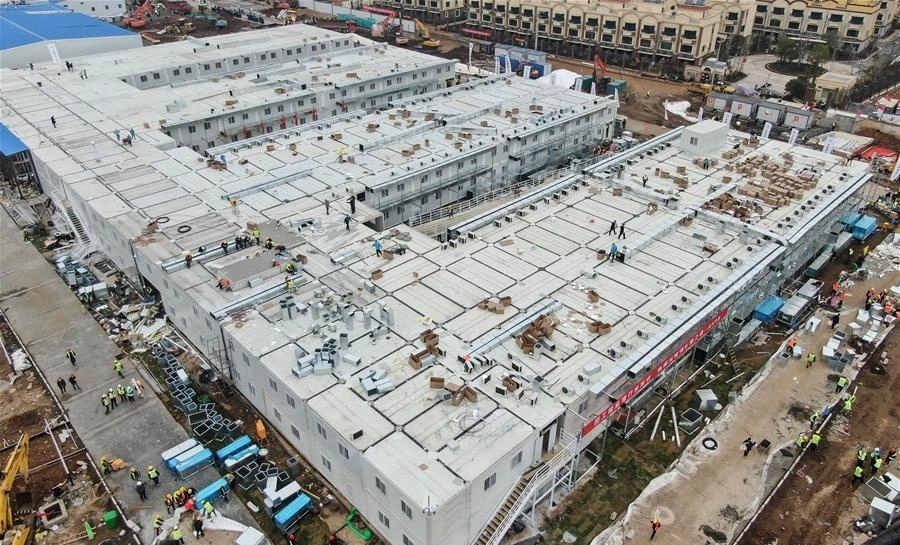 During the COVID-19 pandemic in 2020, China built the Huoshenshan and Leishenshan hospitals in Wuhan, capable of providing over 2,000 beds, in just 10 days.
During the COVID-19 pandemic in 2020, China built the Huoshenshan and Leishenshan hospitals in Wuhan, capable of providing over 2,000 beds, in just 10 days.
At that time, Western media commented that China was always prepared for a large-scale, full-scale war—and indeed, it possessed the capability to do so.
If you still don’t understand why China doesn’t form an alliance after reading all of this, just think about it: When a country has over 100 million military reservists, a complete industrial chain spanning every sector, the most formidable grassroots organizational capabilities in the world, and top-tier military technology across land, sea, and air—does having allies really matter all that much?
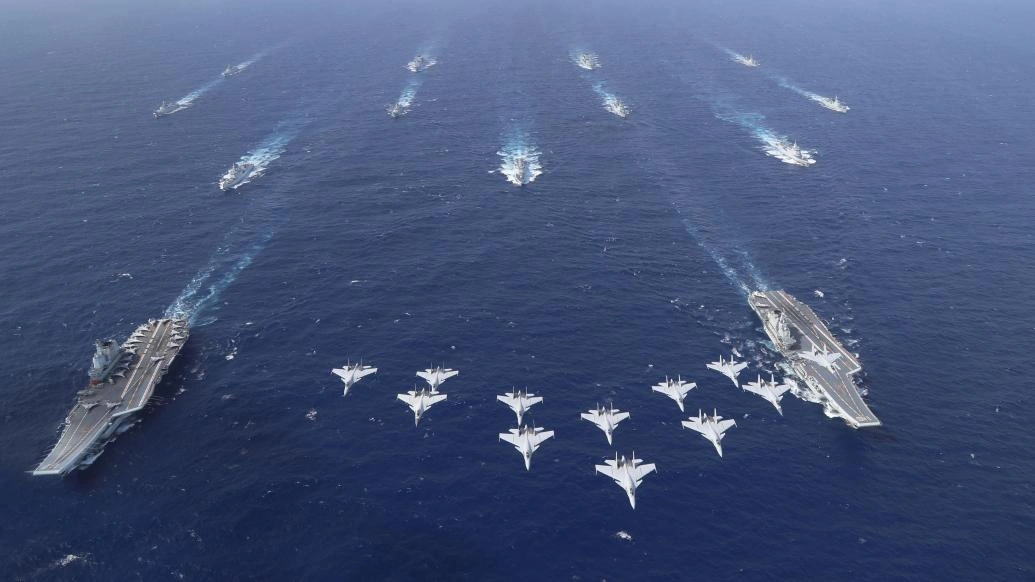 In October 2024, the Chinese Navy held its first dual-carrier formation exercise in the South China Sea.
In October 2024, the Chinese Navy held its first dual-carrier formation exercise in the South China Sea.
It’s like how people interact: when you’re weak, you might go out of your way to please others and build relationships, only to be met with disdain or indifference. But when you’re strong, even if you stay at home, a crowd will gather around you, eager to build connections. This is the reality of human relationships, the reality of international relations, and the fundamental reason behind China’s non-alignment strategy.
The post Why Does China Never Want to Ally with Russia? first appeared on China Academy.
]]>The post TikTok, Taiwan, the Panama Canal: Trump’s China Tactics Explained first appeared on China Academy.
]]>The post TikTok, Taiwan, the Panama Canal: Trump’s China Tactics Explained first appeared on China Academy.
]]>The post Yoon Suk-yeol Shattered the Beacon of Democracy of South Korea first appeared on China Academy.
]]>First and foremost, he was an ‘undisciplined’ president. By ‘undisciplined,’ I mean behavior that goes against principles, ethics, and values. He had long touted liberal democracy and international solidarity as his trademarks, but in reality, he became an enemy of liberal democracy. Under the pretext of “defending liberal democracy from the threat of anti-state forces trying to overthrow the South Korean system,” he declared martial law and attempted to destroy the democratic constitutional order.
Under liberal democracy, the state is merely a neutral vessel reflecting the interests and preferences of its citizens, who are individuals. Moreover, the president is a representative and servant of the people. However, Yoon Suk-yeol rushed to make himself the master, identifying himself with the state and labeling those who opposed him as anti-state forces. This is the height of lawlessness. The impeachment of the president by the large opposition party, legislative overreach, and budget manipulation, which Yoon condemns, are common occurrences in advanced democracies. To declare a state of emergency and suppress opposing forces under these circumstances is an act that abandons the fundamental principles of liberal democracy.
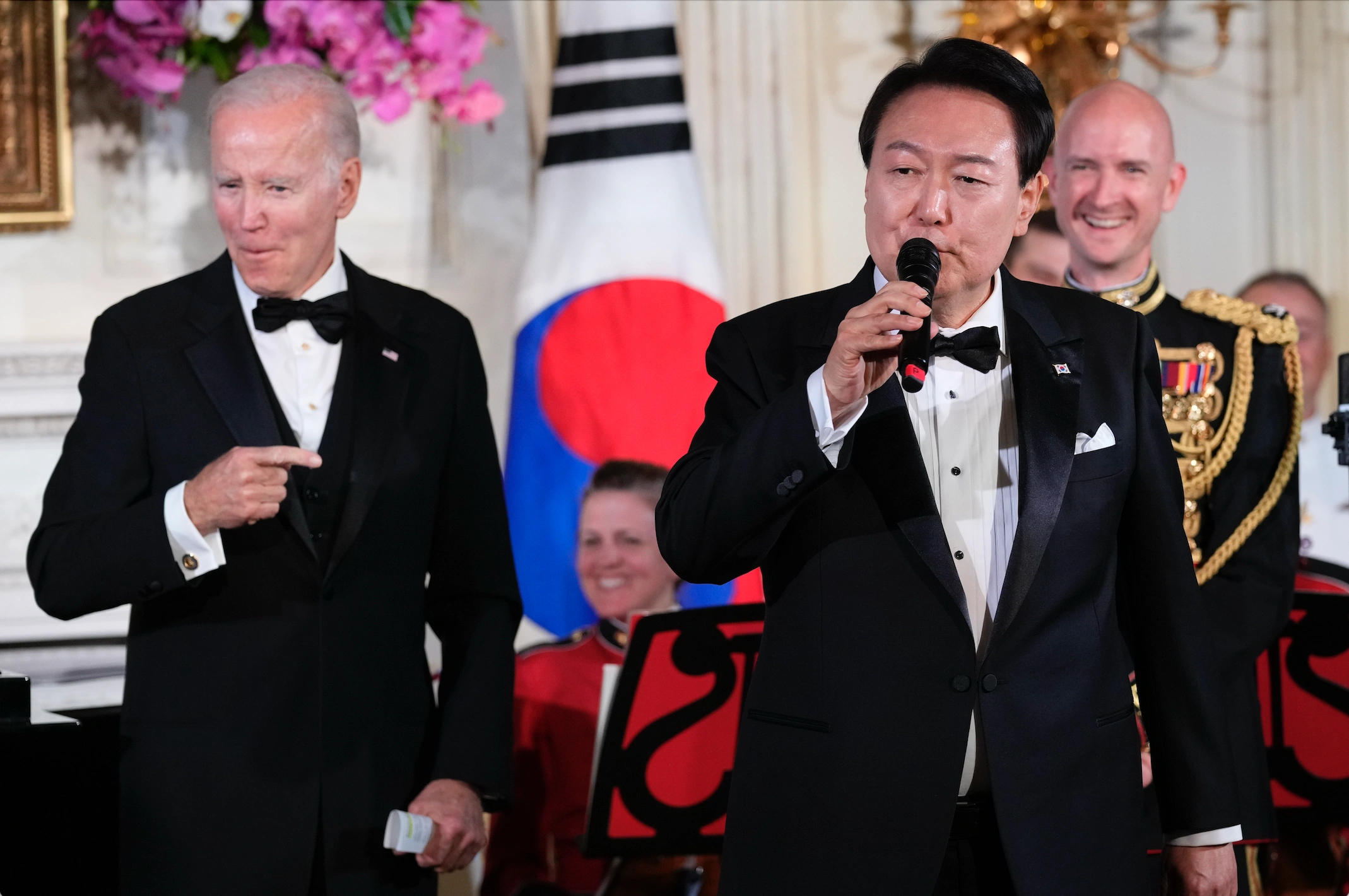 The Biden administration was caught off guard by Yoon’s declaration of martial law.
The Biden administration was caught off guard by Yoon’s declaration of martial law.
Secondly, Yoon Suk-yeol was a ‘lawless’ president. Even though the conditions for declaring martial law — war or rebellion — were not met, he went ahead with the declaration. Furthermore, he deployed the military to neutralize the constitutional authority of the National Assembly and attempted to seize information from the constitutional body, the National Election Commission, by infiltrating its offices and servers. These were clear illegal and unconstitutional acts. Including the Speaker of the National Assembly, leaders of both ruling and opposition parties, critical politicians, journalists, former Supreme Court justices, and sitting judges who had acquitted opposition leaders among those to be arrested alongside the martial law declaration constitutes a severe violation of the rule of law and the constitutional principle of the separation of powers. His actions, as a former prosecutor general and legal professional, are truly inexplicable.
Under liberal democracy, the state is merely a neutral vessel reflecting the interests and preferences of its citizens, who are individuals. Moreover, the president is a representative and servant of the people. However, Yoon Suk-yeol rushed to make himself the master, identifying himself with the state and labeling those who opposed him as anti-state forces. This is the height of lawlessness. The impeachment of the president by the large opposition party, legislative overreach, and budget manipulation, which Yoon condemns, are common occurrences in advanced democracies. To declare a state of emergency and suppress opposing forces under these circumstances is an act that abandons the fundamental principles of liberal democracy.
Secondly, Yoon Suk-yeol was a ‘lawless’ president. Even though the conditions for declaring martial law — war or rebellion — were not met, he went ahead with the declaration. Furthermore, he deployed the military to neutralize the constitutional authority of the National Assembly and attempted to seize information from the constitutional body, the National Election Commission, by infiltrating its offices and servers. These were clear illegal and unconstitutional acts. Including the Speaker of the National Assembly, leaders of both ruling and opposition parties, critical politicians, journalists, former Supreme Court justices, and sitting judges who had acquitted opposition leaders among those to be arrested alongside the martial law declaration constitutes a severe violation of the rule of law and the constitutional principle of the separation of powers. His actions, as a former prosecutor general and legal professional, are truly inexplicable.
Third, he was an ‘ignorant’ president. He lacked objective facts on policy issues and was accustomed to believing and spreading fake news. This was most clearly revealed in his fourth speech. His claim that the military mobilized to the National Assembly was small turned out to be false. He also made the erroneous claim that the special budget for the National Assembly had increased, despite it having been reduced for years, and he falsely asserted that the budget for supporting the export of Czech nuclear plants had been cut by 90%. His statement that the reduction in reserve funds made disaster response difficult was also untrue, as was his claim that child care allowances had been unilaterally cut.
Yoon Suk-yeol defended the declaration of martial law by claiming it was a “warning martial law” meant to alert the public about the anti-state misdeeds of the large opposition party and to stop them. However, the evidence contradicting this claim is overwhelming. In his fourth address, he insisted, “I told them not to block the National Assembly,” but after declaring martial law, he called the police commissioner six times and directly ordered, “Arrest them all. They are violating martial law, so arrest them.” His claim that “the national administration was paralyzed and social order disrupted due to the tyranny and violence of the opposition’s legislative dictatorship, making it impossible to carry out normal administrative and judicial functions,” along with his warning that South Korea would turn into a “paradise for spies, a drug den, and a gangster nation,” were nothing more than baseless, provocative fake news.
Finally, he was an ‘incompetent’ president. This means he had zero political skill and execution ability. Politics is the art of turning the impossible into the possible, but he has practiced a subtractive politics, making even possible things impossible. Accustomed to the hierarchical order and top-down command structure of the prosecution, he had no appreciation for the virtues of listening, nor any ability to mediate or resolve conflicts. He seemed more comfortable with authoritarianism than democracy. His execution capabilities were also severely lacking. In this martial law crisis, didn’t he demonstrate a clear failure in command and control? He turned competent personnel in the military and police into accomplices in treason, leading them down a path of ruin. How dangerous is it to entrust a country to such a leader?
In 2016, during the impeachment of President Park Geun-hye, the term hon-yong-mu-do (昏庸無道) became popular. It describes a foolish and weak ruler whose misrule causes chaos in the world, making proper governance impossible. However, with Yoon Suk-yeol, we seem to have a combination of both a foolish ruler (hon-gun) and a tyrannical ruler (pok-gun). The passing of the impeachment motion in the National Assembly is a fortunate event. Now, let us watch closely as the Constitutional Court determines the fate of the treasonous leader.
The post Yoon Suk-yeol Shattered the Beacon of Democracy of South Korea first appeared on China Academy.
]]>The post Sorry Mr. Sullivan, But You Just Got China So Wrong first appeared on China Academy.
]]>Today’s United States feels as though it’s caught between a state of semi-autism and half-dreaming, with a worldview that seems to say, “I don’t care what you think, only what I think.” As for everything else? Just BACK OFF. Dealing with the U.S. today inevitably leads to a profound sense of helplessness and frustration.
To put it bluntly, the U.S. decision-making elite, especially their foreign strategy team, is not normal in its cognition. Chas W. Freeman Jr. described it as self-anesthetization and self-hypnosis. I would say it’s a deep pathology.
This pathology permeates from the inside out, and it’s not just directed at China; it’s their attitude toward the entire world. However, only China refuses to buy into it, and their distortion of China is stronger than in other areas. China is increasingly able to view the U.S. from an equal footing and recognize this abnormality. It’s like the famous fairy tale “The Emperor’s New Clothes,” where the two con men weave invisible clothes while other countries pretend to follow America’s lead in running around naked.
So, what’s Sullivan’s purpose for visiting China? As depicted in the British sitcom “Yes, Prime Minister”, whenever Western governments officially deny any link between two matters through an anonymous official, the reality is often the opposite. Sullivan’s purpose is clear: the Democratic Party needs China’s support in the 2024 U.S. presidential election to help them defeat Trump.

First, the U.S. needs China to convey to the outside world that Biden’s foreign policy is impressive, his financial policies are solid, and his China strategy is effective. Therefore, Biden is a good president, and now he’s passing the torch to Harris, making her a good president too—so everyone should vote for her.
Second, they are laying the groundwork for significant economic policy moves in September. The U.S. economy currently relies on opening and closing the floodgates—too much water? Shut them. Too little water? Open them. Other than that, they can’t produce anything substantive. Their industrial policies, manufacturing reshoring, and infrastructure development are merely a joke. The entire U.S. is caught in a massive bubble. Therefore, they need to lower interest rates, and the cut may be larger than expected. However, if China doesn’t cooperate in macroeconomic, financial, and fiscal support, the U.S. could be in serious trouble. Thus, the U.S. is asking for China’s help.
Unfortunately, the U.S. political scene is currently dominated by the notion that the States is number one and invincible, and forever. The Democrats claim that everything has been fine, and only the Republicans, infected by the “Trump virus,” think otherwise. They insist that closing one’s eyes and repeating that America is the best will make it so, and thus there’s no need to make concessions to China. America has already given China face by coming to Beijing with polite requests, and China should feel honored and bow in gratitude.
And the Republicans are even worse than their colleagues across the aisle, believing the entire world should “pay tribute” to the U.S., feeling honored to be exploited by America. Talk of negotiation? You just don’t deserve it.
This leads to the current stalemate, where America expects China to make “selfless contributions” and even feel good about it. It’s as if America slapped your right cheek, and you’re supposed to offer your left cheek and kindly ask if America’s hand hurts. America demands that China willingly accept sanctions, not speak out, not retaliate, and not bring up Taiwan. They want to do whatever they want, assuring you that Taiwan won’t be “allowed” to pursue so-called legal independence, and that’s enough, you should be grateful. How dare you confront the Philippines in the South China Sea? The Philippines is America’s little brother. And as for Russia, you should just kill it off like we say.
Sullivan is the National Security Advisor to the U.S. President, but this is not a public office. He’s appointed by the president, not requiring Senate approval. He’s just an advisor who serves the president, similar to an imperial envoy in ancient China.
Sullivan and our Foreign Minister Wang Yi have interacted before. Yet despite spending a year trying to understand China, the U.S. still hasn’t corrected its understanding. Or to be blunt, the entire U.S. diplomatic team, from President Biden downwards, is in a collective state of daydreaming, living in a fancy world in their brains.
What makes America so awkward, leaving people feeling helpless and bewildered, is that despite their lack of capability, their dreams are more beautiful than ever before.
This state is best embodied by Harris’s campaign platform: You lack it, I’ll give it to you. You don’t like this, I’ll change it to what you want. The costs and methods don’t matter; just say Harris’s name, and your dreams will come true. This is a surreal moment in the history of Western international relations and a manifestation of the decline of Western civilization, as Oswald Spengler predicted.
Sullivan’s visit is doomed to be a fruitless attempt by the U.S. to gain concessions from China without offering anything in return. The goal is to secure practical commitments from China to maximize Harris’s chances in the election, all without guaranteeing future commitments. It’s highly likely that once they win, they’ll kick down the ladder because the Republicans will certainly be tough the U.S.-China strategy as always. For China, this presents a significant challenge.
Ultimately, what matters is strength. China is special, it’s a rising power with significant emerging market characteristics. This isn’t modesty; it’s the objective reality. Yet, China is increasingly able to view America from a level playing field, adopting a calm attitude toward U.S. relations.
Economically, China certainly faces challenges, but so does the entire world, entering a long-term downturn and macroeconomic stagnation. Among major nations, China’s economic performance, in terms of overall indices, is undoubtedly the best.
For example, if America’s macroeconomic data is as good as they claim, then I’ve got three questions waiting for answers:
First, where do so many of Trump’s supporters come from?
If the incumbent claims they have managed the economy well and the American public buys it, Harris wouldn’t meet a strong opposition challenger like Trump. Unlike China, where people may voice concerns about the economy through various analyses, the U.S. claims everything is going great, while Americans themselves often say they have no idea how this supposed prosperity relates to their daily lives. If things are so great, then why the need for interest rate cuts?

Second, why was non-farm employment revised downward by 810,000 jobs from April last year to March this year?
During this period, the U.S. claimed to have created 2.9 million jobs, but the revision erased 30% of these jobs. This conveniently creates a scenario where the Federal Reserve must cut interest rates. If the economy was truly strong, shouldn’t employment be robust as well?
These employment figures imply that the U.S. requires rate cuts to stimulate the economy to the necessary degree. In this context, China should be confident in recognizing that the U.S. is seeking help from China. In this strategic game initiated by the U.S., China has no obligation to comply. China’s effort should be put on a more constructive strategy toward U.S.-China relations.
This constructive strategy must include one essential component: when the U.S. acts out of line and disrupts the stability of U.S.-China relations, and the relationship is not developing on a healthy track, China must punish and correct the U.S. This is an inevitable path.
Third, what has been the real outcome of U.S. initiatives such as the CHIPS Act, the Inflation Reduction Act, and the $1.2 trillion infrastructure plan?
How many charging stations have been built? How many new railways, roads, and bridges have been constructed? What kind of impact has this had on the U.S. economy? How are the new chip factories progressing? What is the output of these new chip plants? How many computing power centers have been built in the U.S. using advanced computing chips? How many companies are applying large-scale models in ways that are truly creating value and driving productivity growth in the U.S.?
After reflecting on these three questions, we can form a more balanced understanding of the U.S.-China strategic competition. In this new framework, we have reason to believe that China does not need to make concessions to the U.S.
We should also have a broader perspective on Sullivan’s visit or the ongoing strategic dialogue between China and the U.S. Now, China should act more like a patient teacher educating a stubborn student, guiding the next step of America by a combination of words and actions.
China aims to safeguard its national interests while maintaining a healthy and dynamic balance in U.S.-China relations. This is not the unilateral responsibility of one side. Achieving this benefits both sides, and a framework of “tit for tat” and “word for word, action for action” will gradually form, becoming the general trend of future development.
Sullivan arrived and stepped off the plane with no red carpet, only a clearly marked red line on the ground. Even if there’s no carpet now, he doesn’t mind; he still came. Last time, when Blinken visited Shanghai, he was left on his own, but he didn’t mind. Why? Because he doesn’t have the stature to act that way, nor does he have the leverage to make so many demands. Everyone is discussing matters pragmatically—regardless of China’s attitude, they still have to sit down and talk seriously. This marks a subtle shift in the dynamics.
 In the afternoon of August 27th, U.S. National Security Advisor Sullivan’s plane landed in Beijing.
In the afternoon of August 27th, U.S. National Security Advisor Sullivan’s plane landed in Beijing.
In this phase of asymmetric and uneven power growth and transition, recognizing and understanding these details is essential for fully comprehending and managing U.S.-China relations.
The post Sorry Mr. Sullivan, But You Just Got China So Wrong first appeared on China Academy.
]]>